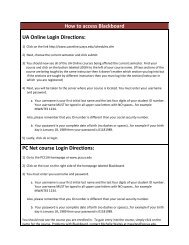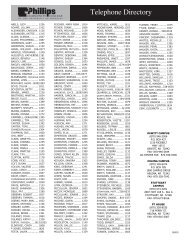College Catalog 2009-2010 PDF - Phillips Community College
College Catalog 2009-2010 PDF - Phillips Community College
College Catalog 2009-2010 PDF - Phillips Community College
You also want an ePaper? Increase the reach of your titles
YUMPU automatically turns print PDFs into web optimized ePapers that Google loves.
Course Descriptions<br />
ACADEMIC SKILLS<br />
DS 103 Introduction to <strong>College</strong> Reading Skills<br />
3 hrs. lec., 3 credits<br />
Pre-requisite: COMPASS score of 0-65.<br />
Co-requisite: DS 1031. Introduction to <strong>College</strong> Reading<br />
Skills is designed to provide students with opportunities<br />
to improve understanding of written materials, reading<br />
comprehension strategies, and writing skills. The focus<br />
of this course will be on reading comprehension strategies<br />
such as vocabulary development, main idea/supportive<br />
detail comprehension and written communications. This<br />
is the first in a sequence of two reading classes. A grade<br />
of “C” or better is required in this class before enrollment<br />
in the next level reading class is permitted.<br />
DS 1031 Reading Lab I<br />
1 hr. lab, 1 credits<br />
Co-requisite: DS 103. Reading Lab I is required for<br />
students taking Introduction to <strong>College</strong> Reading Skills.<br />
This lab is designed to provide students with additional<br />
support to enhance reading skills.<br />
DS 123 <strong>College</strong> Reading Strategies<br />
3 hrs. lec., 3 credits<br />
Pre-requisite: Completion of DS 103 with a grade of “C”<br />
or better and/or COMPASS score of 66-81.<br />
Co-requisite: DS 1231. <strong>College</strong> Reading Strategies is<br />
designed for students to further develop general reading<br />
skills and college level reading strategies with an emphasis<br />
on higher levels of reading with vocabulary, comprehension,<br />
critical thinking and writing. A grade of “C” or better is<br />
required to exit this class.<br />
DS 1231 Reading Lab II<br />
1 hr. lab, 1 credits<br />
Co-requisite: DS 123. Reading Lab II is required for<br />
students taking <strong>College</strong> Reading Strategies. This lab is<br />
designed to provide students with additional support to<br />
enhance reading skills.<br />
ADVANCED MANUFACTURING<br />
TECHNOLOGy<br />
IT 113 Industrial Safety and Sanitation<br />
3 hrs. lec., 3 credits<br />
This course emphasizes the importance of safety and<br />
sanitation in an industrial setting, the design of Industrial<br />
Safety Programs and Safety Management. Attention is<br />
focused on meeting federal safety regulations, setting up<br />
safety programs, etc.<br />
IT 123 Industrial Graphics<br />
3 hrs. lec., 3 credits<br />
Prerequisite: CT 114 or permission based on computer<br />
background. This course contains three sections.<br />
AutoCAD LT 97 is used to introduce concepts necessary<br />
in production and visualization of technical drawings, and<br />
makes up approximately one-third of the course. RFFlow<br />
is used to introduce concepts necessary to develop process<br />
flow charts for business and industry processes. Finally,<br />
Microsoft PowerPoint is used to organize the drawings and<br />
concepts developed in the other parts of the class into simple<br />
management presentations. Some emphasis is placed on<br />
developing the ability of the student to recognize and<br />
interpret standard symbols used on industrial drawings.<br />
IT 133 Industrial Electricity<br />
3 hrs. lec., 3 credits<br />
This course provides an introduction to the principles of<br />
both AC and DC electrical circuits. Emphasis is placed on<br />
industrial applications involving electric motors, controls<br />
and instrumentation.<br />
I T 1 6 3 B a s i c s o f B l u e p r i n t s & I n d u s t r i a l<br />
Measurements<br />
3 hrs. lec., 3 credits<br />
This course covers the basic concepts and symbols of<br />
industrial blueprints. Students will also study and apply<br />
measurements in the metric and standard systems using<br />
conventional devices such as tape measures, decimal rules,<br />
micrometers, dial calipers and protractors. Some basic<br />
mathematical calculations common to industry will be<br />
explored and practiced.<br />
IT 183 Principles of Industrial Science<br />
3 hrs. lec., 3 credits<br />
Prerequisite: Exemption from DS 103/123 and MS 1013.<br />
This course will provide information related to the basic<br />
scientific principles as applied to industry. Topics will be<br />
drawn from the disciplines of chemistry, physical science<br />
and environmental science.<br />
IT 193 Processing Cereals & Oilseeds<br />
3 hrs. lec., 3 credits<br />
Prerequisite: Exemption from DS 103/123. This course<br />
will provide information related to the current processes<br />
for preparation, value-adding, and quality indicators<br />
and assurances in the processing of cereals and oilseeds.<br />
Emphasis will be placed on the receiving and processing<br />
of grains such as rice and soybeans.<br />
IT 214 I ntroduc tion to Programmable Logic<br />
Controllers<br />
4 hrs. lec., 4 credits<br />
This course will provide students with the information<br />
required to begin using state-of-the-art programmable<br />
controllers. Students will cover information on<br />
programmable controller terminology, operation,<br />
and basic programs entry, coupled with hands-on<br />
lab experience to reinforce learning. Allen-Bradley’s<br />
programmable controllers are used in hands-on activities<br />
for demonstration.<br />
IT 223 Principles of HVAC<br />
3 hrs. lec., 3 credits<br />
This course introduces the basic laws of thermodynamics<br />
and thermodynamic cycles. In addition, elementary<br />
concepts in heat transfer are discussed. Applications in<br />
heating, ventilating and air conditioning are included.<br />
Laboratory exercises support the theoretical discussions.<br />
IT 233 Contemporary Supervision<br />
3 hrs. lec., 3 credits<br />
This course emphasizes the application of psychological<br />
principles as they are related to professional pursuits.<br />
Particular topics included are individual differences and<br />
group behavior involved in personnel selection, industrial<br />
safety and hygiene, motivation, personnel training,<br />
consumer behavior, human error, job analysis and human<br />
factor engineering.




